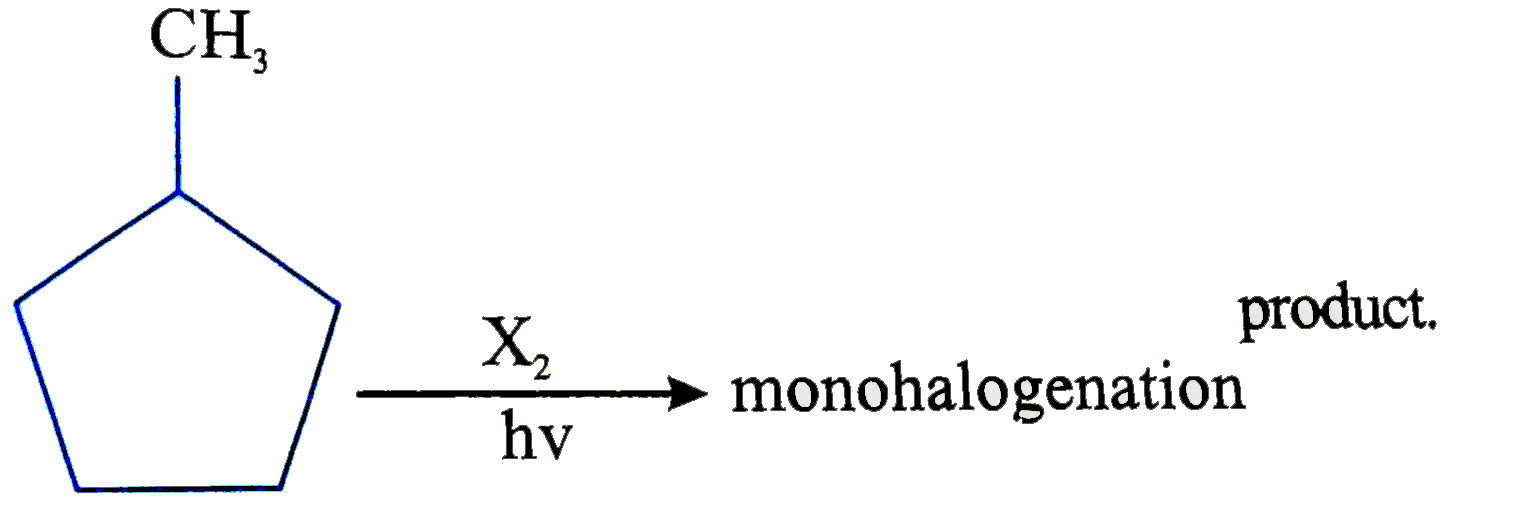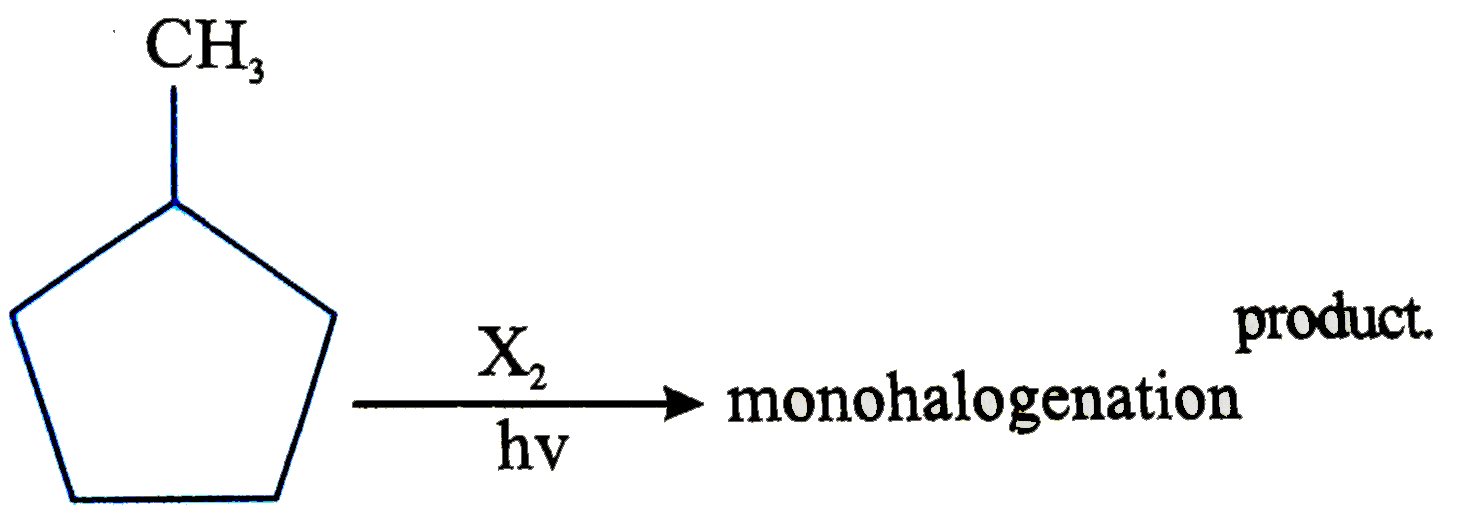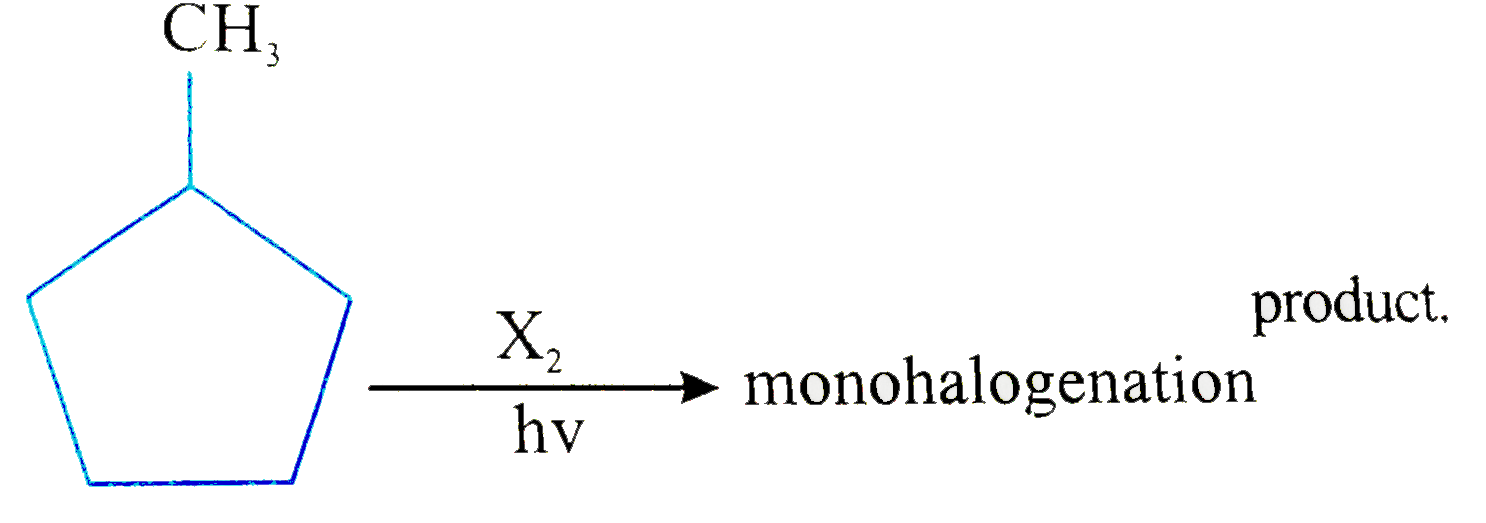Complete Solutions to comprehension of chapter ALKANES of Class 11 book with complete answers and questions
| Class 11 | CHEMISTRY |
| Chapter | ALKANES |
| NARAYANA | comprehension |
| Number Of Questions | 18 |
| Academic Year | 2023-24 |
Wurtz reaction involves the comdensation of two molecules of alkyl halides in the presence of sodium and dry ether
`R-X+2Na+R-Xoverset("dry ether")toR-R+2NaX`
In this reaction small amount of alkene is also formed as by product.
`CH_(3)CH_(2)Br+CH_(3)CH_(2)Broverset("Na/dry ether")toCH_(3)-CH_(2)-CH_(2)-CH_(3)+underset("By-product")ubrace(CH_(2)=CH_(2)+CH_(3)-CH_(3))`
Tertiary alkyl halides do not give wurtz reaction. Frankland reaction is similar but has certain advantages over wurtz reaction. it is useful in the synthesis of symmetrical alkanes. frankland reaction is shown by primary,
Secondary as well as tertiary alkyl halide.
Q. Among all isomers of hexane which of the following isomer cannot be obtained in a good yield by wurtz reaction (from symmetrical alkyl halides)?
1. n-hexane
2. iso hexane
3. 2,3-dimethyl butane
4. neo hexane
View SolutionWurtz reaction involves the comdensation of two molecules of alkyl halides in the presence of sodium and dry ether
`R-X+2Na+R-Xoverset("dry ether")toR-R+2NaX`
In this reaction small amount of alkene is also formed as by product.
`CH_(3)CH_(2)Br+CH_(3)CH_(2)Broverset("Na/dry ether")toCH_(3)-CH_(2)-CH_(2)-CH_(3)+underset("By-product")ubrace(CH_(2)=CH_(2)+CH_(3)-CH_(3))`
Tertiary alkyl halides do not give wurtz reaction. Frankland reaction is similar but has certain advantages over wurtz reaction. it is useful in the synthesis of symmetrical alkanes. frankland reaction is shown by primary,
Secondary as well as tertiary alkyl halide.
Q. Which among the followng compound will give wurtz reaction with good yield ?
View SolutionWurtz reaction involves the comdensation of two molecules of alkyl halides in the presence of sodium and dry ether
`R-X+2Na+R-Xoverset("dry ether")toR-R+2NaX`
In this reaction small amount of alkene is also formed as by product.
`CH_(3)CH_(2)Br+CH_(3)CH_(2)Broverset("Na/dry ether")toCH_(3)-CH_(2)-CH_(2)-CH_(3)+underset("By-product")ubrace(CH_(2)=CH_(2)+CH_(3)-CH_(3))`
Tertiary alkyl halides do not give wurtz reaction. Frankland reaction is similar but has certain advantages over wurtz reaction. it is useful in the synthesis of symmetrical alkanes. frankland reaction is shown by primary,
Secondary as well as tertiary alkyl halide.
Q. A mixture of ethyl iodide and methyl iodide is subjected to wurtz reaction. the product that will not formed is
View SolutionIn the study of chlorination of propane, four product (A,B & C,D) of the formula `C_(3)H_(6)Cl_(2)` were isolated. Each was further chlorinated to provide trichloro products `(C_(3)H_(5)Cl_(3))`. It was found that A provide one trichloro product, B gave two and C&D each gave three. It is found that D is optically active.
Q. Formula of the compound A is
View SolutionIn the study of chlorination of propane, four product (A,B & C,D) of the formula `C_(3)H_(6)Cl_(2)` were isolated. Each was further chlorinated to provide trichloro products `(C_(3)H_(5)Cl_(3))`. It was found that A provide one trichloro product, B gave two and C&D each gave three. It is found that D is optically active.
Q. Correct formula of the product of chlorination of B is-
View SolutionIn the study of chlorination of propane, four product (A,B & C,D) of the formula `C_(3)H_(6)Cl_(2)` were isolated. Each was further chlorinated to provide trichloro products `(C_(3)H_(5)Cl_(3))`. It was found that A provide one trichloro product, B gave two and C&D each gave three. It is found that D is optically active.
Q. Correct formula of the compound D is
View Solution monohalogenation
monohalogenation
Q. Light is involved in
View Solution monohalogenation
monohalogenation
Q. Which halogen will give the best yield of the monohalogenation product?
View Solution monohalogenation
monohalogenation
Q. Howmany monohaloderivatives are possible (excluding stereomers)?
View SolutionIn the study of chlorination of propane, four prouducts A, B, C, and D of the formula `C_(3)H_(6)C1_(2)` were isloated. Each of then was further chlorinated to provide trichloro products, `C_(3)H_(5)C1_(3)` . It was found that A provided one trichloro product, B gave two, and C and D each gave three. What the structural of A, B, C, and D ?
View SolutionIn the study of chlorination of propane, four prouducts A, B, C, and D of the formula `C_(3)H_(6)C1_(2)` were isloated. Each of then was further chlorinated to provide trichloro products, `C_(3)H_(5)C1_(3)` . It was found that A provided one trichloro product, B gave two, and C and D each gave three. What the structural of A, B, C, and D ?
View SolutionIn the study of chlorination of propane, four prouducts A, B, C, and D of the formula `C_(3)H_(6)C1_(2)` were isloated. Each of then was further chlorinated to provide trichloro products, `C_(3)H_(5)C1_(3)` . It was found that A provided one trichloro product, B gave two, and C and D each gave three. What the structural of A, B, C, and D ?
View Solution
In the above reaction 'A' is arbide of `3^(rd)` period element which forms amphoteric oxide.
Q. IUPAC name of 'E' is
View Solution
In the above reaction 'A' is arbide of `3^(rd)` period element which forms amphoteric oxide.
Q. Homologue of 'D' is
View Solution
In the above reaction 'A' is arbide of `3^(rd)` period element which forms amphoteric oxide.
Q. 'D' can be converted into 'B' by using
View SolutionR' in RMGX is
View Solution
If molecular weight of 'A' is 30 then
Q. Difference in the molecular formulae of 'D' & 'C' is
View Solution
If molecular weight of 'A' is 30 then
Q. Ratio of number of primary hydrogens in 'C' and secondary hydrogens 'D'
View Solution
comprehension questions and complete solutions for chapter ALKANES of NARAYANA CHEMISTRY (HINGLISH) of Class 11